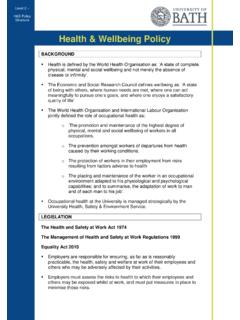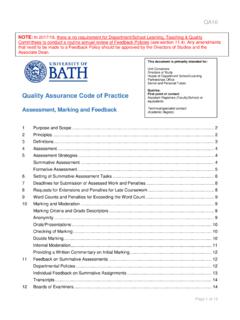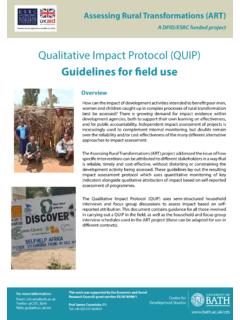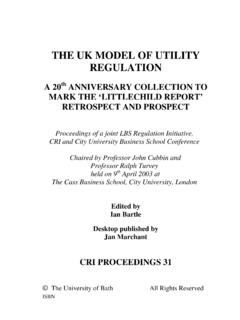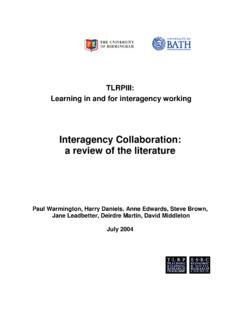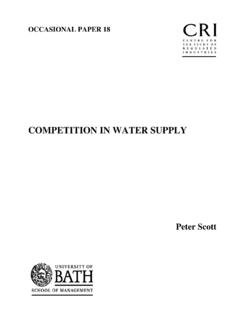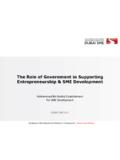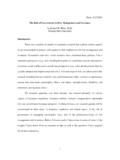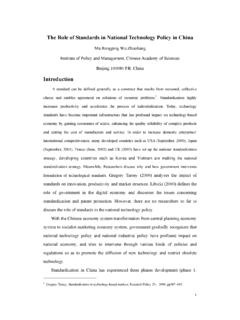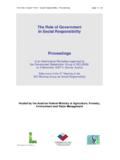Transcription of CORPORATE SOCIAL RESPONSIBILITY A ROLE IN …
1 RESEARCH REPORT 16 CORPORATE SOCIAL RESPONSIBILITY A ROLE IN government policy AND REGULATION? Constantina Bichta The University of Bath School of Management is one of the oldest established management schools in Britain. It enjoys an international reputation for the quality of its teaching and research. Its mission is to offer a balanced portfolio of undergraduate, postgraduate and post-experience programmes, research and external activities, which provide a quality of intellectual life for those involved in keeping with the best traditions of British universities. CORPORATE SOCIAL RESPONSIBILITY A ROLE IN government policy AND REGULATION? Constantina Bichta Desktop published by Jan Marchant The University of Bath All rights reserved ISBN Centre for the study of Regulated Industries (CRI) The CRI is a research centre of the University of Bath School of Management.
2 The CRI was founded in 1991 as part of the Chartered Institute of Public Finance and Accountancy (CIPFA). It transferred to the University of Bath School of Management in 1998. It is situated on the 8th floor of Wessex House (North), adjacent to West car park. The CRI is an interdisciplinary research centre investigating how regulation and competition are working in practice, both in the UK and abroad. It is independent and politically neutral. It aims to produce authoritative, practical contributions to regulatory policy and debate, which are put into the public domain. The CRI focuses on comparative analyses across the regulated industries. CRI activities and outputs include: Regulatory statistics, information and analysis Discussion papers and Occasional papers Regulatory Briefs, Reviews and International series Research Reports and Technical papers Seminars, courses and conferences Direct links with regulated industries, the regulators, the academic community and other interested parties are an important feature of the work of the CRI.
3 The CRI is non-profit making. Its activities are supported by a wide range of sponsors. BAA CIPFA Department of Trade and Industry Environment Agency National Audit Office NERA National Grid Transco Network Rail OFWAT RSM Robson Rhodes Royal Mail Thames Water United Utilities Wessex Water Further information about the work of the CRI can be obtained from:- Peter Vass, Director-CRI, School of Management, University of Bath, Bath, BA2 7AY or CRI Administrator, Jan Marchant, Tel: 01225 383197, Fax: 01225 383221, e-mail: and from the CRI s web site, which includes events and the publications list. iiiPREFACE The CRI is pleased to publish Research Report 16 on CORPORATE SOCIAL RESPONSIBILITY - A Role in government policy and Regulation?
4 By Constantina Bichta. Constantina was a Research Officer at the CRI until June 2003. Understanding the potential role of CSR in companies is important to the design of regulation. At one level it interfaces with ideas of self-regulation and co-regulation, and at another it challenges the basis of the modern liberal market economy. Personal and moral responsibilities of directors and employees have also to be considered alongside the role of the corporation in meeting the legitimate expectations of its investors and shareholders. CORPORATE SOCIAL RESPONSIBILITY can clearly be seen to be a good thing. Nevertheless, Governments have to take overall RESPONSIBILITY for ensuring that conduct failures - whether market or non-market failures - are regulated appropriately, taking account of each of the three pillars of sustainable development: the economic, SOCIAL and environmental pillars.
5 CSR may have a role to play as one of the instruments of, or surrogates for, regulatory policy , but that depends not only on its theoretical potential, but whether that potential can be demonstrated in practice by companies. We hope that this research makes a contribution to that debate. The CRI would welcome comments on the report. Comments should be addressed to: Peter Vass Director CRI School of Management University of Bath Bath, BA2 7AY The CRI publishes work on regulation by a wide variety of authors, covering a range of regulatory topics and disciplines, in its International, Occasional and Technical Paper series. The purpose is to promote better understanding and debate about the regulatory framework and the processes of decision making and accountability.
6 Enquiries or manuscripts to be considered for publication should be addressed as above. The views of authors are their own, and do not necessarily represent those of the CRI. Peter Vass Director, CRI September 2003 iv vCONTENTS Page 1 Introduction 1 2 CORPORATE SOCIAL RESPONSIBILITY (CSR) definition 7 Operational definition of CSR compliance plus, best practice and cost-benefit analysis 8 The role of government 9 3 The academic view theoretical debates 13 The development of CORPORATE SOCIAL RESPONSIBILITY 13 The classical view of CORPORATE SOCIAL RESPONSIBILITY 15 The new meaning of CORPORATE SOCIAL RESPONSIBILITY the theory of modern corporation 17 Contrasting models of the corporation a schematic overview 26 Business ethics 27 4 The political view proposals and policies 31 CORPORATE law and governance in Britain a historical review 31 Current reforms company law review (1998-2001)
7 40 Current political views on CSR 44 Two prevailing models of CORPORATE SOCIAL RESPONSIBILITY 48 5 The regulated industries 51 Introduction 51 The legal framework for UK regulated industries 52 CSR activities in UK regulated industries 54 The regulated companies 59 The water companies 62 The electricity companies 67 The rail network operator 72 The telephone companies 75 The postal services operator 80 6 Conclusions 85 The practical meaning and role of CSR for the UK regulated companies 85 The impact of CSR practices on regulatory policy 87 Final remarks 90 vi CONSTANTINA BICHTA Dr Constantina Bichta, Research Officer, Centre for the study of Regulated Industries (CRI), University of Bath School of Management 1 1 INTRODUCTION The important thing for business and society at large to understand is the limit to voluntary action, which is the point where government need to intervene.
8 If we are to live within the earth s capacity and share its resources equitably, economies must be transformed. That cannot be done by business alone 1 This paper sets out to describe the role of CORPORATE SOCIAL RESPONSIBILITY (CSR) in government policy and examine its relevance to a particular sector, the regulated utilities. Current theoretical and political debates and activities conducted at the national and international level, suggest a widespread interest shared by government , industry, civil society and non-governmental organisations (NGOs) regarding the role of government and business for the natural environment, SOCIAL development and SOCIAL inclusion. Ten years after the 1992 Rio earth summit, the world summit on sustainable development (WSSD) was held in Johannesburg (26 August 4 September 2002) to review any progress made since Rio and begin to tackle the global issues of environment and development.
9 The world s governments, however, were unable to agree on a binding legal framework on the environmental behaviour of global corporations, despite the calls for government action to hold corporations accountable for their Instead, government representatives have settled for purely voluntary industry actions ie, the global compact and type II partnership CORPORATE accountability and governance issues also were brought to the attention of the summit delegates, as Friends of the Earth called for a legally binding international framework on CORPORATE accountability and liability. In the UK, the battle between voluntarism and compulsion is at a critical stage (Cowe, Porritt, 2002). The government has appointed a minister for CORPORATE SOCIAL RESPONSIBILITY , but at the moment the government acts as an enabler of business productivity and innovation.
10 SOCIAL and environmental policy issues are tackled through the setting of minimum legal standards, the use of a light touch legislation regime such as the Pensions Act 1995 and proposals for reforming the British company law ie, directors to act in the interests of the company s shareholders but also take into account the wider interests of customers, employees, suppliers, impact on the local community and the natural environment; annual reports to include stakeholder relations, environmental and community impact. The CORPORATE RESPONSIBILITY coalition (CORE) however, has brought together a broad range of NGO s and it has raised the stakes with Linda Perham s bill calling for compulsory SOCIAL and environmental reporting by companies.
